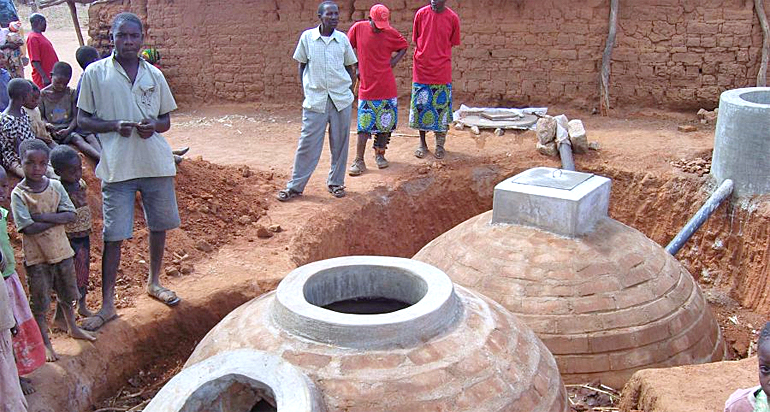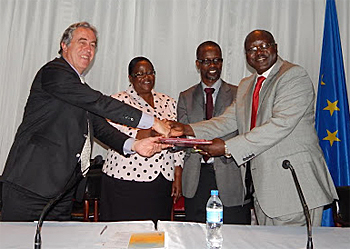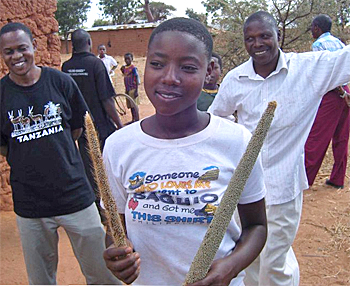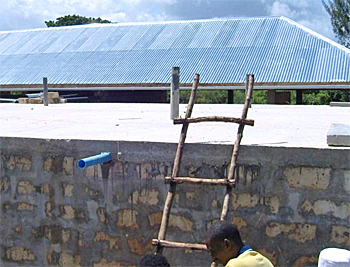3R partners to introduce water buffering measures in eco-village project in Igunga, Tanzania
 Non-profit charitable organization Heifer Nederland and Heifer International Tanzania have been awarded by the European Union a 1.6 million euro grant for a climate adaptation project in the Igunga district of Tanzania, including measures for water buffering.
Non-profit charitable organization Heifer Nederland and Heifer International Tanzania have been awarded by the European Union a 1.6 million euro grant for a climate adaptation project in the Igunga district of Tanzania, including measures for water buffering.
Four Dutch organisations, Aqua for All, Rain Foundation, Acacia and MetaMeta - gathered in the 3R partnership - are responsible for the introduction of sustainable water resources management.
The 3R approach stands for recharge, retention and reuse of water. It is a concept developed for farmers in water scarce areas to optimise the buffering of rainwater in a catchment for both water and food security.
 Signing ceremony on EU climate diplomany day.
Signing ceremony on EU climate diplomany day.
Five grants for poor farming communities
The grant is one of the 5 grants under the second phase of the EU Global climate change alliance (GCCA) programme that were signed on EU Climate Diplomacy Day on 17 June.
The five new grants are awarded to projects to improve resiliency of vulnerable communities in various areas of Tanzania including Dodoma, Pemba, Arusha, Usambara mountains and Igunga district.
The projects will scale up the integrated eco-village approach combining interventions in agriculture, agro-forestry, energy, water and natural resources management.
In the Igunga district a total of 72,000 inhabitants are to benefit from the project.
 The pilot eco-village project in the Chololo district lead to a much higher production of pearl millet.
The pilot eco-village project in the Chololo district lead to a much higher production of pearl millet.
Disrupted rain patterns
From 2011 to 2014 the concept of Eco-village was piloted in Tanzania as a new - more holistic - way to implement a wide range of climate adaptation measures in agriculture, livestock, water and forestry amongst three farming communities in the Chololo district.
In the past, the first rains signaled the start of the rainy season and farmers were encouraged to plant their seeds as early as possible. However, the changing climate has disrupted the pattern, with communities reporting that the rain season is less predictable, starting later, finishing earlier, leading to low productivity or crop failure, food shortage or famine.
The solution found in Chololo is to resist the temptation to seed early, but wait one month so the young plants will have not reached the flowering stage by February when the dry spell hits. This way the plants do not need much water and can survive a few weeks without rain, reaching flowering stage in March when the rains return and guarantee a good harvest.
The Chocolo eco-village included the installation of solar-driven water pumps and underground digestors (top photo) for the processing of animal dung to biogas and manure.
 The Chololo project also included the rainwater collection from the roof of the new school building.
The Chololo project also included the rainwater collection from the roof of the new school building.
Rainwater harvesting at catchment level
The 3R partnership will introduce a systematic and pragmatic way to buffer rainwater.
Based on a strategic planning and catchment-wide implementation level the 3R approach will increase water availability at both community and at farm level.
The approach will introduce a tailored set of small to medium size water buffering structures across nine villages on a pilot basis and in the larger catchment if appropriate, contributing to climate resilience.
This news item is based on publications on the website of Rainwater for food security, EU Global climate change alliance and EU Chololo Eco-village project.
Read also in this website
● Stockholm Water Week: Rainwater management crucial for eradication global poverty, 4 September 2014
● Projects: Fresh water buffering in coastal lowlands
More information
Heifer Nederland
Roosendaal, the Netherlands
+31 165 520 123
www.heifer.nl
Rainwater for food security
c/o Rain Foundation
Amsterdam, the Netherlands
+31 20 581 82 50
www.rain4food.net
Video presentation of water measures of the pilot Eco-village project in Chololo, Tanzania



